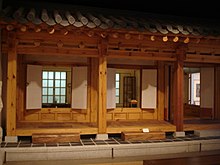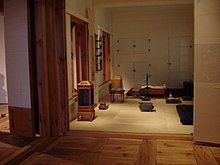Bang (Korean: 방) is a Korean word meaning "room". In a traditional Korean house, a sarangbang is the study or drawing room, for example.[citation needed]
| Bang | |
 Traditional Korean sarangbang (study room). Exterior, in the British Museum Department of Asia. | |
| Korean name | |
|---|---|
| Hangul | 방 |
| Hanja | |
| Revised Romanization | bang |
| McCune–Reischauer | pang or bang |

In modern Korea (especially in the South), the concept of a bang has expanded and diversified from being merely a walled segment in a domestic space, to including buildings or enterprises in commercial, urban, space, such as a PC bang (an internet café), a noraebang (a karaoke room), sojubang (a soju room, i.e. a pub), manhwabang (a manhwa room, where people read or borrow manhwa) and a jjimjilbang (elaborate Korean public bathhouse). This can be compared with the similar expansion of the concept of a "house" to include upper houses, opera houses, coffee houses, and publishing houses.[citation needed]
Phonetically more tensed word ppang (빵) is used as an abbreviation of a noun gambang (감방; 監房; kambang), meaning "jail".
Multibang
editMultibang is a kind of entertainment venue in South Korea where people can play video games and board games. In addition, they can eat snacks, drink non-alcoholic beverages, sing, and watch films.[1]
See also
editNotes
edit- ^ S Kwaak, Jeyup (19 July 2011). "Evolution of Korean 'bang' culture". travel.cnn.com. Retrieved 2015-10-15.
References
edit- "City of the Bang". Ninth Architecture Biennial of Venice 2004. Retrieved 2005-06-16.
- ""Bang" Culture". Just a Hakwon. Archived from the original on 2005-04-27. Retrieved 2005-06-16.
- Roman and Daniela Jost. "Sarangbang (Sarang-bang, Sarang Chae, Anchae) Korean Men's and women's quarters". Traditional Korean and Japanese furniture. Retrieved 2005-06-16.
- "Korean Housing". Archived from the original on 2005-02-06. Retrieved 2005-06-16.